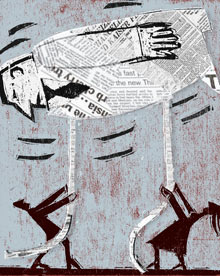The Guardian View
When Labour’s Gordon Brown embraced “post neo-classical endogenous growth theory” in 1994, he was ridiculed by his opponents. This said more about his critics than Mr Brown. His speech reflected an engagement with academic debates as well as a worldview and diagnosis distinct from Tory narratives. He judged education to be key, as growth depended on human capital. By contrast, today Labour’s top team struggles to say exactly what they believe will drive growth and how they will achieve it.
Part of the reason is that mainstream economics is proving incapable of giving sensible answers to important questions. Whether it is the financial crash, the pandemic or inflation shocks, the response is that spending cuts are needed as public debt threatens to bankrupt the nation. Many economists are questioning their discipline’s worth. Last month, the Nobel laureate Angus Deaton blogged that economics was in “disarray” and had “largely stopped thinking about ethics”. Jeremy Rudd of the US Federal Reserve writes scornfully in his latest book, A Practical Guide to Macroeconomics, that economists’ role today is to justify “what elite interests want to do anyway: deregulate, pay fewer taxes, keep wages as low as possible”.
One school of thought attempting to rewrite the textbooks is called modern monetary theory, whose face is Stephanie Kelton, a former economic adviser to Bernie Sanders. She argues that there is no financial constraint on government spending; money can be created and invested so long as there is capacity in the economy to absorb the cash. If not, inflation will follow. This shouldn’t be controversial. John Maynard Keynes said as much in his 1940 book, How to Pay for the War. The theory is not just about deficits: a strong exporting nation should pursue fiscal surpluses – an insight attributed to Prof Kelton’s tutor and ex-Treasury adviser Wynne Godley.
Her work made headlines during Covid-19, when governments spent big without asking first where the money would come from. Prof Kelton’s book The Deficit Myth became a bestseller. Next month, a movie, Finding the Money, hits US screens. The film looks at why politicians hide behind economic “myths” rather than explain to voters the trade-offs required to help them. Prof Kelton’s positions are often counterintuitive, which makes them interesting. Her current argument that rising US interest rates might be inflationary finds her agreeing with her sharpest critic, Larry Summers. Such challenges should be welcome in Britain. The US debates have produced an industrial policy powered by government deficits – and the world’s fastest growing advanced economy.
Mr Brown’s successor Rachel Reeves prefers a deadening consensus, sacrificing policies to placate business while committing to Tory spending now that is “paid for” by austerity later. Both major parties say deregulation would crowd in private investment and the state could capture the ensuing productivity gains. The Tories would use the proceeds for tax cuts whereas Labour would spend them on public services. This strategy has failed since 2010. Why would it work now? One of Ms Reeves’ predecessors said that “the history of British policymaking in the last hundred years has taught us that on all the other occasions when major economic misjudgments were made, broad-based political, media, financial and popular opinion was in favour of the decision at the time, and the dissenting voices of economists were silenced or ignored”. Ed Balls’ 2011 speech is as relevant today as it was then.



